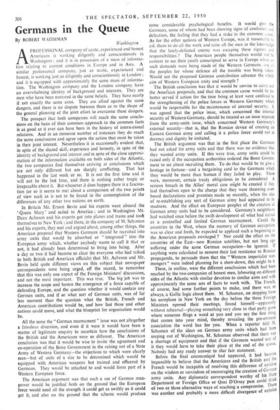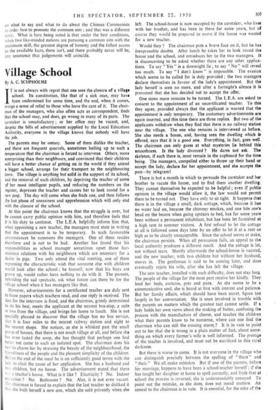Germans in the Queue
By ROBERT WAITHMAN Washington APROFESSIONAL company 'of acute, experienced and honest Americans is working diligently and conscientiously in Washington ; and it is in possession of a mass of informa- tion relating to current conditions in Europe and in Asia. A similar professional company, just as acute, experienced and
honest, is working just as diligently and conscientiously in London ; and it is equipped with approximately the same mass of informa- tion. The Washington company and the London company have
an overwhelming identity of background and interests. They are men who have been nurtured in the same beliefs. They have nearly if not exactly the same aims. They are allied against the same dangers, and there is no dispute between them as to the shape of the general planning of the joint effort to overcome these dangers.
The prospect that both companies will reach the same conclu- sions on the basis of their common approach to the common facts is as good as it ever can have been in the history of international relations. And in an immense number of instances they do reach the same conclusions and agree upon the action that must be taken in their joint interest. Nevertheless it is occasionally evident that, in spite of the shared skill, experience and honesty, in spite of the identity of background and interest and in spite of the close approxi- mation of the information available on both sides of the Atlantic, the two companies find themselves arriving at conclusions which are not only different but are sharply conflicting. That has happened in the last week or so. It is not the first time and it will not be the last time, and there is nothing either tragic or irreparable about it. But whenever it does happen there is a fascina- tion (or so it seems to me) about a comparison of the two points of view such as is not to be found in the contemplation of the differences of any other two nations on earth.
In Britain Mr. Ernest Bevin and his experts went aboard the ' Queen Mary' and sailed to America ; and in Washington Mr. Dean Acheson and his experts got into planes and trains and took themselves to New York ; and there, in the company of M. Schuman and his experts, they met and argued about, among other things, the American proposal that Western Germans should be recruited into army units that would be absorbed or " integrated " into the European army which, whether anybody wants to call it that or not, it had already been determined to bring into being. After a day or two it had become so clear (to everyone who had talked to both British and American officials) that Mr. Acheson and Mr. Bevin held quite different views on this subject that newspaper correspondents were being urged, off the record, to remember that this was only one aspect of the Foreign Ministers' discussions, and not the most important. This was true. The big job was to increase the scope and hasten the emergence of a force capable of defending Europe, and the question whether it would contain any German units, and if so what sort of German units, was of far less moment than the question what the British, French and American contributions would be, and how fast these and other nations could move, and what the blueprint for organisation would be.
All the same the " German rearmament " issue was not altogether a frivolous diversion, and even if it were it would have been a matter of legitimate enquiry to ascertain how the conclusions of the British and the Americans were so different. The American conclusion was that it would be wise to invite the agreement and co-operation of the Bonn Government in the raising not of a State Army of Western Germany—the objections to which were clearly seen—but of units of a size to be determined which would be equipped with American weapons but trained and officered by Germans. They would be attached to and would form part of a Western European force.
The American argument was that such a use of German man- power would be justified both on the ground that the European force would need all the strength it could get, as swiftly as it could get it, and also on the ground that the scheme would produce
some considerable psychological benefits. It would give the Germans, some of whom had been showing signs of confusion and
defeatism, the feeling that they had a stake in the common cause.
As for the other nations of Western Europe, was it reasonable to ask them to do all the work and raise all the men in the knom ledge that the lately-defeated enemy was escaping these rigours and responsibilities ? The American people themselves would not be content to see their youth conscripted to serve in Europe when no such demands were being made of the Western Germans, one et the peoples for whose defence all the trouble was being taken. Would not the proposed German contribution advance the whole aim of Western European unity and strength ?
The British conclusion was that it would be unwise to carry out the American proposals, and that the common cause would be far better served if action for the time being at least were confined to the strengthening of the police forces in Western Germany which would be responsible for the maintenance of internal security. It
was agreed that the police issue, which concerned the internal
security of WesternGermany, should be treated as an issue separate from the army-units issue, which concerned Western Germany's external security—that is, that the Russian device of creating an Eastern ,German army and calling it a police force could not in decency and dignity be imitated.
The British argument was that in the first place the Germans had not asked for army units and that there was no evidence that they wanted army units. If this were true, army units could be raised only if the occupation authorities ordered the Bonn Govern. ment to set about recruiting them. To do that would be to give a hostage to fortune—and a bargaining card to the Germans which they would be more than human if they failed to play. There were, moreover, certain treaty obligations to be considered A serious breach in the Allies' moral case might be created if they laid themselves open to the charge that they were throwing over- board declarations and promises made so recently, when the idea of re-establishing any sort of German army had appeared to be madness. And the effect on European peoples of the creation of German army units had to be considered. Germany's neighbours had watched once before the swift development of what had started as a controlled and limited German rearmament. Could the countries in the West, where the memory of German occupation was so clear and fresh, be expected to applaud such a beginning as the American proposals envisaged ? Nor could the effect on the countries of the East—now Russian satellites, but not long ago suffering under the same German occupation—be ignored. If anything were calculated to remove their last resistance to Russian propaganda, to persuade them that the " Western imperialist war- mongers " were indeed planning for a show-down, this might be it.
These, in outline, were the different conclusions which had been reached by the two companies of honest men, labouring on different sides of the Atlantic with similar devotion to similar aims and with approximately the same sets of facts to work with. The French, of course, had some further points to make, and there was, as always, a Gallic logic about them. M. Schuman, on stepping from his aeroplane in New York on the day before the three Foreign Ministers opened their meetings, found himself—apparently without rehearsal—playing something very close to that party game where someone flings a word at you and you say the first thing that comes into your mind, thereby revealing the pre-eminent association the word has for you. When a reporter told M. Schuman of the ideas on German army units which had been seeping out of Washington, M. Schuman observed that there was a shortage of equipment and that if the Germans wanted any of it they would have to take their place at the end of the queue. Nobody had any ready answer to that fair statement. Before the final communiqué had appeared, it had become impossible to believe that the Americans and the British and the French would be incapable of resolving this difference of opinion on the wisdom or unwisdom of encouraging the creation of German army units. Any diplomatic correspondent worthy of his State Department or Foreign Office or Quai D'Orsay pass could think of two or three alternative ways of reaching a compromise. There was another and probably a more difficult divergence of opinion on what to say and what to do about the Chinese Communists in order best to promote the common aim ; and that was a different story. What is here being noted is that under the best conditions, when two like-minded nations are pursuing a common aim with the maximum skill, the greatest degree of honesty and the fullest access to the available facts, there isn't, and there probably never will be, any assurance that judgements will coincide.







































 Previous page
Previous page